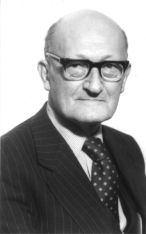By Julian Lewis
Deter – Winter 1985-86
 "On the Occasion of the 40th Anniversary of the October Revolution,"
"On the Occasion of the 40th Anniversary of the October Revolution,"
read the stylish invitation card,
"the Soviet Ambassador would be honoured by the company of Mr Harold Macmillan at a Reception at 18 Kensington Palace Gardens, W.8, on Thursday, 7th November 1957."
If the Prime Minister and the other 1,300 recipients of similar invitations were puzzled by the drops of blood discreetly oozing from the sickle on the Soviet crest and the requirement to wear "Mourning Dress", all was made clear in the accompanying memorandum urging people to "pause and consider" what acceptance of a genuine invitation would entail.
"Our reasons for approaching you,"
wrote its author,
"are not based on any special animosity to the Soviet Ambassador ... [but] his invitation is issued in the name of a Government which, in the years since the war, has been responsible for more collective human misery and oppression than any other single agency in world affairs."
A Soviet official told the Daily Express:
"We are very upset at the whole thing. It is disgraceful."
Most of Fleet Street, however, thought it hilarious.
For nearly forty years, the Czech-born journalist and campaigner, Josef Josten, who died in London on 29 November, skilfully employed the weapons of satire and ridicule to expose the hypocrisy of Communist totalitarianism and to deter those in the West foolish enough to fraternise with its practitioners.
There were many similar cases – such as the "Alternative Programme" he produced for a visit of the Red Army Choir, featuring such unforgettable numbers as: "HOW WE FOUGHT FOR WARSAW IN 1944 (BY DOING NOTHING)"; "OH WHAT A LOVELY WAR WE STARTED TOGETHER IN 1939" (Lyrics by Molotov and Ribbentrop); "SEE YOU AGAIN ON THE USSURI RIVER" (A Russo-Chinese love song); and, of course, the "SOVIET LEAPING DANCE" (in which half of Europe is occupied by sending Soviet heroes from one country to another).
The 250,000 bogus Pound-notes Josef produced and circulated to mark the visit to Britain in 1976 of Soviet propaganda chief and comintern veteran Boris Ponomarev, so alarmed the Bank of England that the Counterfeit Currency Squad was called in, despite the replacement of the Sovereign's head by that of Leonid Brezhnev and the KGB serial number. But the humour was all directed to aims of deadly seriousness.
There were the escapes that Josef organised: the Romanian Olympic hurdler, Ion Opris, who kept on running after the end of his race at the White City in 1956 – straight to Josef's car and freedom in the West; the engaged Czech couple who fled directly from their coach in Britain, protected by Josef and three others in a dramatic scene captured on film by an alert press photographer.
According to a remarkable Obituary in The Times on 3 December, his
"assistance to a large number escapees earned him the title of the Czech Scarlet Pimpernel".
The most amazing escapes were, nevertheless, his own.
As a young journalist in his native Prague, he had joined the resistance after the Nazi invasion. With the Gestapo on his track in December 1939, he had been captured in Hungary, jumped from a train taking him back to Slovakia, reached France via the Middle East, and Britain after the Dunkirk evacuation.
Trained as a commando in Scotland, he was closely associated with the courageous Czech team which returned to Prague to assassinate SS General Reinhard Heydrich, architect of the "Final Solution" and one of the most evil figures of the Third Reich. Though narrowly missing being chosen for the final mission, his return to the front came with the Normandy landings and led to another nine months of arduous duty.
A letter to Josef from defecting Czech intelligence officer, Josef Frolik, reproduced in the Spectator of 28 December 1974, is illuminating:
"After joining the 'British Section' of our Intelligence Service, I read your file,"
wrote Frolik.
"It was of a remarkable size. It had thousands of pages of information about you and your activities ... On the suggestion of President Novotny, you were to be kidnapped. A special 'diplomatic courier' had arrived in London for the purpose ... who constructed on the spot a special box in which you were to be smuggled aboard a Czechoslovak State Airlines plane.
"For a long time afterwards, the box stood in the cellars of the Embassy building ... Then came from Mr Novotny the suggestion that you be murdered ... Among the proposals on how to carry out your liquidation was a suggestion of a plastic bomb to be attached to the chassis of your car. Another suggested poison ..."
As Josef revealed in 1984, the British Section of Czech Intelligence was desperate to veto any attempt on his life in London, for fear that it would compromise a key agent already planted within the British Intelligence establishment. So it was in Switzerland in 1973 that the Czech poisoners struck with serious, but not fatal consequences.
Despite this trauma, he was soon busy publishing again, organising mire exhibitions, filling the Royal Albert Hall in protest against the suppression of Polish Solidarity, and from 1979 running his Committee for the Defence of the Unjustly Prosecuted – securing the release of Czech and other victims of Human Rights abuses by mobilising dozens of distinguished Parliamentarians from all political parties.
Like many other exiles with direct experience of totalitarian oppression, Josef knew that the last hope of liberty for his beloved countrymen in years to come depended on the strength and alertness of the counties of the Free World. His cheerfulness, tenacity and courage in our common cause put every one of us in his debt.